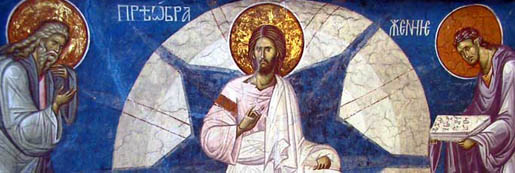Life & Faith
Translation of the relics of St Alexander Nevsky
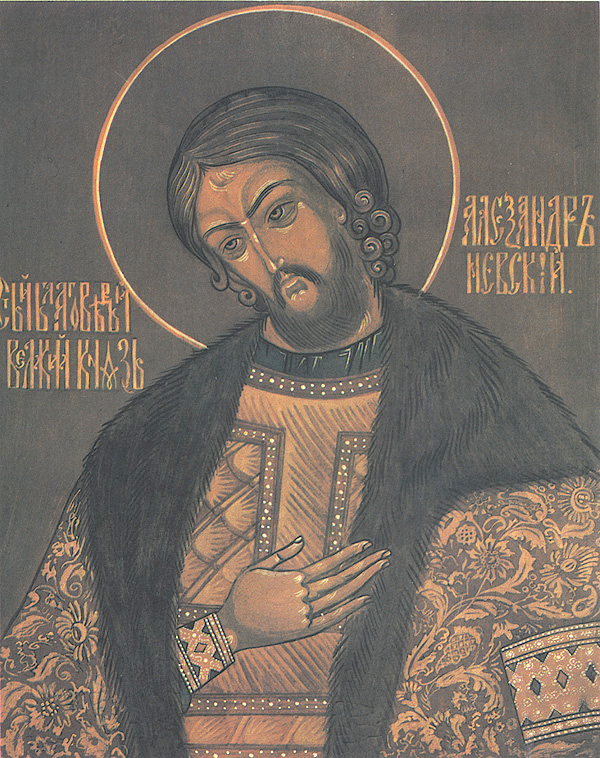 The Holy Prince Alexander Nevsky (in monastic schema Alexis) died on the return journey from the Horde at Gorodtsa on the Volga, on November 14, 1263, and on November 23, 1263 he was buried in the Cathedral Church of the Nativity Monastery in the city of Vladimir (Where there is a memorial to the holy prince. Another memorial is in the city of Pereslavl-Zalessk).
The Holy Prince Alexander Nevsky (in monastic schema Alexis) died on the return journey from the Horde at Gorodtsa on the Volga, on November 14, 1263, and on November 23, 1263 he was buried in the Cathedral Church of the Nativity Monastery in the city of Vladimir (Where there is a memorial to the holy prince. Another memorial is in the city of Pereslavl-Zalessk).
Veneration of the Prince began right at his burial, where a remarkable miracle took place. The saint extended his hand for the prayer of absolution (a written document placed in the coffin). Great Prince John (1353-1359), in his spiritual testament written in the year 1356, left to his son Demetrius (1363-1389), the future victor of the Battle of Kulikovo, “an icon of Saint Alexander.” The incorrupt relics of the holy Prince were uncovered, because of a vision, before the Battle of Kulikovo in the year 1380, and then they were sent forth for a local celebration.
Eleventh Sunday after Pentecost
The Man Who Owed Ten Thousand Talents Matthew 18: 23-35
From the Explanation of the Gospel of St. Matthew by Blessed Theophylact, Archbishop of Ochrid and Bulgaria 23.
Therefore is the kingdom of the heavens likened unto a man who was a king, who wanted to settle accounts with his servants. The gist of the parable teaches us to forgive our fellow servants who have sinned against us, especially if they fall down before us begging forgiveness. To interpret the parable in its particulars should be done only by one who has the mind of Christ. Nevertheless, we shall attempt it. The kingdom is the Word of God, but it is not a kingdom of small extent, but of the heavens. The Word is likened to a man who was a king, that is, He Who became incarnate for our sake and appeared in the likeness of men, and He settles accounts with His servants as a Good Judge. He does not punish without first judging: that would be cruel. 24-25. And when he had begun to reckon, one was brought unto him, who owed him ten thousand talents. But forasmuch as he had not to pay, his lord commanded him to be sold, and his wife, and children, and all that he had, and payment to made. It is we ourselves who owe ten thousand talents, receiving benefaction every day yet giving back nothing good to God in return. He who owes ten thousand talents is also that ruler who has received from God the protection and allegiance of many men, each man being like a talent, and then does not employ his sovereignty well. Selling the debtor along with his wife and children indicates alienation from God, for the one who is sold goes to another master. And is the wife not the flesh, being the mate of the soul, and the children, the evil deeds done by the soul and the body? He commands the flesh to be given to Satan for ravaging, that is, to be given over to illnesses or to the torment of the demons, but the children, that is to say, the doing of evil deeds, are given over to torture on the rack, as, for example, when God withers the hand that has stolen, or constricts it by means of a demon. See how the woman, which is the flesh, and the children, which is the doing of evil, have been given over to affliction so that the spirit might be saved, as in the case of that man who can no longer steal because his hand is crippled. 26-27. The servant therefore fell down prostrate before him, saying, Lord, have patience with me, and I will pay thee all. Then the lord of that servant was moved with compassion, and loosed him, and forgave him the debt. Behold the power of repentance and the Lord’s love for mankind. For repentance caused the servant to fall down prostrate before the king and cease from wickedness, since he who stands firmly in wickedness cannot be forgiven. In His love for man God forgave the debt entirely although the servant was not asking for complete forgiveness of the debt, but for an extension of time in which to repay it. Learn, therefore, that God gives more than we ask . His love for man is such that even what seems to be severe, the command that the servant be sold, God did not speak out of severity, but to terrify the servant in order to induce him to fix all his hope on entreaty and supplication. 28-30. But the same servant went out, and found one of his fellowservants, who owed him an hundred pence: and he laid hands on him, and took him by the throat, saying, Pay me that thou owest. And his fellowservant fell down at his feet, and besought him, saying, Have patience with me, and I will pay thee all. And he would not: but went and cast him into prison, till he should pay the debt. He who had been forgiven went out, departed, and as a consequence, took his fellow servant by the throat: the one who lacks compassion is not he who remains in God, but rather he who departs from God and is a stranger to Him. So great was the servant’s inhumanity that, although he had been forgiven the greater amount (ten thousand talents), he could not at all forgive the smallest amount (a hundred pence), nor even grant a postponement. And this despite the fact that the fellow servant spoke the very same words to him, reminding him of the words by which he himself had been saved: Have patience with me and I will pay thee all. 31. So when his fellow servants saw what was done, they were very sorrowful, and came and told unto their lord all that was done. The fellow servants are the angels, who are shown here to be haters of evil and lovers of good. They do not tell these things to the Lord as if He were unaware of them, but in order for you, O reader, to learn that the angels watch over us and are angered by man’s inhumanity. 32-34. Then his lord, after he had called him, said unto him, O thou wicked servant, I forgave thee all that debt, because thou desired me: shouldest not thou also have had compassion on thy fellow servant, even as I had pity on thee? And his lord was wroth, and delivered him to the tormentors, till he should pay all his debt. The master in his love for mankind takes issue with the servant, to show that it is not the master, but the savagery and the ingratitude of the servant that has revoked the gift. To what tormentors does he deliver him? To the punitive powers for eternal punishment. For the meaning of till he should pay all his debt is this: "let him be punished till he should pay all that was due." But he will never be able to pay his debt, and therefore his punishment will never end. 35. So likewise shall My heavenly Father do also unto you, if ye from your hearts forgive not everyone his brother their trespasses. He did not say "your Father," but My Father. For such as these are unworthy to have God as their Father. He wants us to forgive from our hearts and not only from our lips. Understand, then, what a great evil is remembrance of wrongs, since it revokes the gift of God though God does not repent of His gifts, nevertheless they are revoked. +++ Father Tadej says: "The body is fed by food, and spirit is by thought”. The most important (for man) is peace and joy! Peace as calmness of the spirit, calm relaxation and joy. This also manifests itself as a good mood. Caring is not good, because it not only consumes our energy, but it also entices us to multiply in the assortment of selfishness, and unbelief.
The Holy Transfiguration of our Lord God and Savior Jesus Christ
Discourse on the Holy Transfiguration of Our Lord God and Savior Jesus Christ of Saint Gregory Palamas, Archbishop of Thessalonica
For an explanation of the present Feast and understanding of its truth, it is necessary for us to turn to the very start of today’s reading from the Gospel: “Now after six days Jesus took Peter, James and John his brother, and led them up onto a high mountain by themselves” (Mt.17:1).
Translation of the relics of the Protomartyr and Archdeacon Stephen from Jerusalem to Constantinople
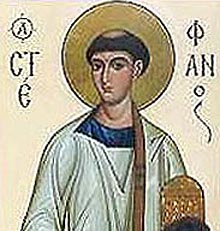 The Transfer of the Relics of the Holy Protomartyr Stephen from Jerusalem to Constantinople took place about the year 428. After the holy Protomartyr Archdeacon Stephen was stoned by the Jews, they left his holy body unburied to be devoured by the beasts and birds. After a day and a night the renowned Jewish teacher of the Law, Gamaliel sent people to take up the body of the Protomartyr. Gamaliel buried him on his own property, in his own tomb, not far from Jerusalem.
The Transfer of the Relics of the Holy Protomartyr Stephen from Jerusalem to Constantinople took place about the year 428. After the holy Protomartyr Archdeacon Stephen was stoned by the Jews, they left his holy body unburied to be devoured by the beasts and birds. After a day and a night the renowned Jewish teacher of the Law, Gamaliel sent people to take up the body of the Protomartyr. Gamaliel buried him on his own property, in his own tomb, not far from Jerusalem.
When Lord’s secret disciple Nicodemus died, Gamaliel also buried him near the grave of Saint Stephen. Afterwards Gamaliel himself, who had been baptized with his son Abibas, was buried near the grave of the Protomartyr Stephen and Saint Nicodemus.
Venerable Mother Angelina of Serbia
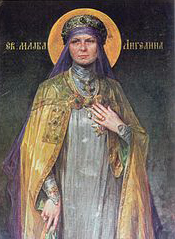 She was a daughter of the Orthodox Albanian prince Gjergj Arianit Komneni, sister-in-law of George Kastrioti Skanderbeg and a wife of Serbian despot Stefan Brankovic, son of George. With her husband she shared the full bitterness of his life, not only in Serbia but also, in exile in Albania and Italy. Their sons Maksim and Jovan she educated in a Christian spirit. When her husband died, she became a nun and devoted herself to prayers and works of mercy, repairing and building churches and monasteries. The people calls her "Mother Angelina". Her wonderworking relics rest along with the relics of her righteous husband Stefan and devoted sons Maksim and Jovan in the monastery of Krusedol. Saint mother Angelina died in the beginning of XVI century.
She was a daughter of the Orthodox Albanian prince Gjergj Arianit Komneni, sister-in-law of George Kastrioti Skanderbeg and a wife of Serbian despot Stefan Brankovic, son of George. With her husband she shared the full bitterness of his life, not only in Serbia but also, in exile in Albania and Italy. Their sons Maksim and Jovan she educated in a Christian spirit. When her husband died, she became a nun and devoted herself to prayers and works of mercy, repairing and building churches and monasteries. The people calls her "Mother Angelina". Her wonderworking relics rest along with the relics of her righteous husband Stefan and devoted sons Maksim and Jovan in the monastery of Krusedol. Saint mother Angelina died in the beginning of XVI century.
Greatmartyr and Healer Panteleimon
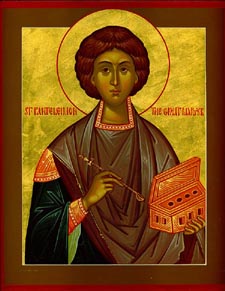 The Great Martyr and Healer Panteleimon was born in the city of Nicomedia into the family of the illustrious pagan Eustorgius, and he was named Pantoleon. His mother Saint Euboula (March 30) was a Christian. She wanted to raise her son in the Christian Faith, but she died when the future martyr was just a young child. His father sent Pantoleon to a pagan school, after which the young man studied medicine at Nicomedia under the renowned physician Euphrosynus. Pantoleon came to the attention of the emperor Maximian (284-305), who wished to appoint him as royal physician when he finished his schooling.
The Great Martyr and Healer Panteleimon was born in the city of Nicomedia into the family of the illustrious pagan Eustorgius, and he was named Pantoleon. His mother Saint Euboula (March 30) was a Christian. She wanted to raise her son in the Christian Faith, but she died when the future martyr was just a young child. His father sent Pantoleon to a pagan school, after which the young man studied medicine at Nicomedia under the renowned physician Euphrosynus. Pantoleon came to the attention of the emperor Maximian (284-305), who wished to appoint him as royal physician when he finished his schooling.
The hieromartyrs Hermolaus, Hermippus and Hermocrates, survivors of the massacre of 20,000 Christians in 303 (December 28), were living secretly in Nicomedia at that time. Saint Hermolaus saw Pantoleon time and again when he came to the house where they were hiding. Once, the priest invited the youth to the house and spoke about the Christian Faith. After this Pantoleon visited Saint Hermolaus every day.

